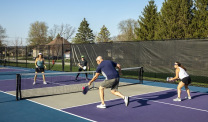Mesothelioma Patients Can Benefit from an Allergen-Free Thanksgiving
Health & WellnessWritten by Tejal Parekh, RDN, LDN | Edited By Amy Edel
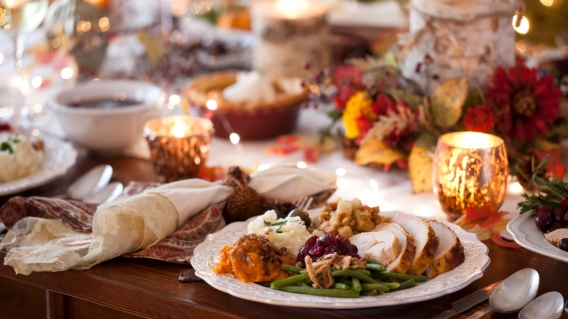
Thanksgiving this year might be a little busier than last with travel restrictions easing. For those with mesothelioma, this can make preparing for some family time joyous, but also particularly challenging.
Typical Thanksgiving celebrations traditionally involve plenty of food. But some mesothelioma patients experience loss of appetite or gastrointestinal issues that can make maintaining a healthy diet and enjoying family meals complicated. It may feel especially stressful if, coupled with these issues, you also have food allergies or are trying to avoid particular food groups.
The great news is, many recipes have been created that cater to every need! With just a little planning, you can make a delicious, healthy meal that will be a perfect addition to any plate.
Here are a few recipes that are free from some common allergens and can be adapted to further eliminate others. They also include cancer-fighting foods such as fruits, vegetables, whole grains and herbs. That is definitely cause to be thankful.

Mediterranean Quinoa Salad
This colorful salad or side dish is a great gluten-free alternative to pasta salad. Other allergens avoided in this dish are eggs and soy. Nuts and dairy are included in this recipe, but suggestions for more allergen-free swaps are also noted below.
- Salad
- 1 cup orange bell pepper, diced
- 1 can (15 ounces) cannellini beans, drained and rinsed
- 1 pound cherry tomatoes, drained and rinsed
- 1/2 large red onion, diced
- 1/2 cup sliced black or Kalamata olives
- 5 cups cooked and cooled quinoa
- Pesto Sauce
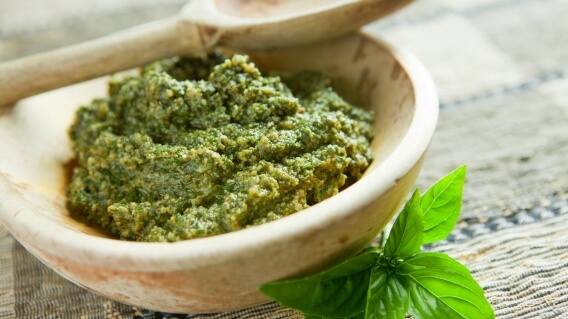
- 1 cup fresh basil
- 1/2 cup pine nuts [For nut allergies, substitute sunflower seeds or pepita.]
- 1/3 cup olive oil
- 1/4 cup Parmesan cheese [For dairy allergies, substitute nutritional yeast.]
- 2 cloves garlic
- 1/2 teaspoon black pepper
- 1/4 teaspoon salt, or to taste
- Water
- Combine salad ingredients and toss with quinoa.
- Place pesto ingredients in a food processor or blender. Purée on medium-high and add water until desired consistency.
- Toss into quinoa mixture. Allow to set at least 2 hours before serving to maximize flavor.
Makes 6 (1 cup) servings
Recipe from American Institute for Cancer Research
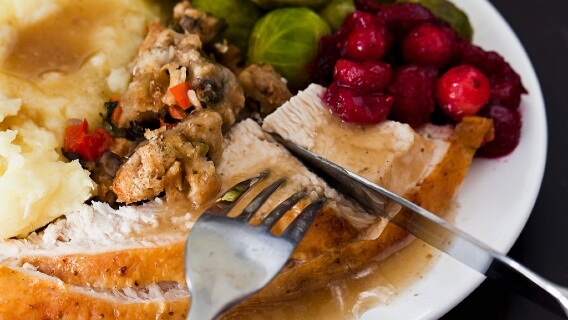
Herb Roasted Turkey Breast with Vegetables
This recipe is the perfect option if you don’t want to cook a whole turkey. It uses just two turkey breasts and incorporates the vegetables while roasting. Brussels sprouts and sweet potatoes contain fiber and antioxidants to help keep you healthy at the holidays.
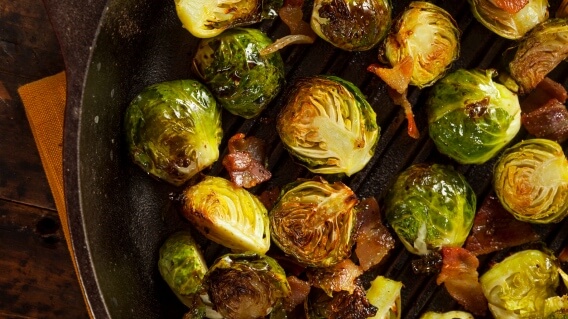
The recipe is free from many allergens, including wheat, dairy, soy, eggs, nuts and fish. Turkey is the central Thanksgiving dish for many families, but for those looking to simplify with one entrée that’s inclusive of guests with specialized diets, there are some turkey-free options as well.
Cauliflower can serve as a nutritious alternative. Tofu is often a popular substitute, but there are a growing number of soy allergy friendly products available. Chickpea flour can also be used to make your own soy-free tofu.
- 2 tablespoons olive oil
- 4 sprigs fresh rosemary, or 1 1/2 teaspoons dried
- 3 sprigs sage, or 1 teaspoon dried
- 5 sprigs fresh oregano, or 1 teaspoon dried
- 4 cloves garlic, peeled
- 1 teaspoon salt
- 1/2 teaspoon black pepper
- 2 (2 1/2 pounds each) bone-in, skin-on turkey breasts [Substitute turkey alternatives noted above for specialized diets.]
- 6 shallots, peeled and halved
- 1 cup low-sodium chicken broth [Substitute vegetable broth for specialized diets.]
- 2 large sweet potatoes, scrubbed and chopped into 1-inch cubes
- 1 1/2 pounds Brussels sprouts, halved
- 1 pound whole carrots, tops removed and sliced in half lengthwise
- Preheat oven to 425 F.
- Place oil, rosemary, sage, oregano, garlic, salt and pepper in a food processor and pulse until finely chopped.
- Gently pull skin back from turkey breast halves. Rub half of oil-herb mixture all over turkey breasts, both under skin and then on top. [Note specific prep instructions for individual alternatives.]
- Arrange 6 shallot halves each on two large, deep, baking pans.
- Set turkey breasts on top of shallots and add 1/2 cup chicken broth to each pan. Roast for 60 minutes. [Cooking times may vary for any turkey substitutions used.]
- While turkey is roasting, toss sweet potatoes, Brussels sprouts and carrots with remaining oil-herb mixture in a large bowl. Set aside.
- Remove turkey from the oven and transfer it and the shallots to a cutting board. Carefully drain the broth (can save for gravy, if desired) from both pans.
- Divide and spread sweet potatoes, Brussels sprouts (flat side down) and carrots over both baking pans in an even layer. Place turkey and shallots on top of vegetables and roast until turkey registers 165 F on a meat thermometer and vegetables are golden brown, about 60 to 75 minutes more. Note: If vegetables or turkey skin are starting to burn, lightly tent the pan in foil.
- Transfer the turkey to a clean cutting board and let it rest for at least 10 minutes before slicing. Serve with roasted vegetables.
Makes 10 servings (4-5 ounces)
Recipe from American Institute for Cancer Research
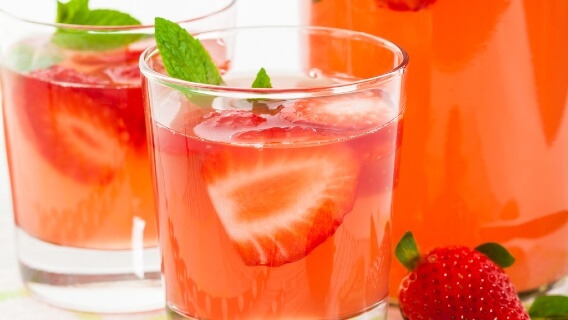
Ginger Pink Lemonade
This quick and simple drink is a little fruity, a little spicy and a little tart. It makes for a delicious alternative to the alcoholic beverages others may be drinking. The lemons and berries provide a big boost of vitamin C – perfect for the season. This recipe is free from many allergens, including wheat, dairy, soy, eggs, nuts and fish.
- 2 1/2 cups water
- 1-inch piece fresh ginger, peeled
- 2 tablespoons agave nectar [May substitute honey or maple syrup]
- 3/4 cup sliced raspberries or strawberries (fresh or frozen)
- 3/4 cup freshly squeezed lemon juice (6 medium lemons)
- Place water, ginger, agave nectar, berries and lemon juice in the container of a blender.
- Process for a few seconds until smooth.
- Transfer to a pitcher and store in the refrigerator until ready to serve. Serve over ice.
Makes 4 (1 cup) servings
Recipe from American Institute for Cancer Research

